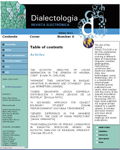Modeling phonetic variation in pluricentric languages: an integrative approach
Article Sidebar

Main Article Content
Simone Ashby
Mário Eduardo Viaro
Sílvia Barbosa
Neuza Campaniço
Adaptive speech technologies offer a vehicle for representing pluricentric language variation and the description of both dominant and non-dominant speech varieties. In this article, the work of the LUPo project is described for modeling phonetic variation across national and sub-national varieties of the Portuguese language. While the motivation for this research is based around the development of highquality pronunciation lexica for a Portuguese text-to-speech system – a goal which, itself, is aimed at facilitating the entry of lesser or undocumented variants into the digital domain – the repercussions for pluricentricity are far reaching. We describe how systems such as LUPo can be used to model variation across phonetically similar and disparate national, sub-national, and sociolectal varieties, as well as
presenting linguists with a means of testing and observing notions of linguistic distance in terms of shared
or innovative rules and phonetic features, and for evaluating the pulling effect of different linguistic centers.
presenting linguists with a means of testing and observing notions of linguistic distance in terms of shared
or innovative rules and phonetic features, and for evaluating the pulling effect of different linguistic centers.
Paraules clau
pluricentric language variation, Portuguese, phonetics, pronunciation generator, dialectometry, variación lingüística pluricéntrica, portugués, fonética, generador de pronunciación, dialectometría
Article Details
Com citar
Ashby, Simone et al. “Modeling phonetic variation in pluricentric languages: an integrative approach”. Dialectologia: revista electrònica, no. 8, pp. 1-26, https://raco.cat/index.php/Dialectologia/article/view/250007.
Drets